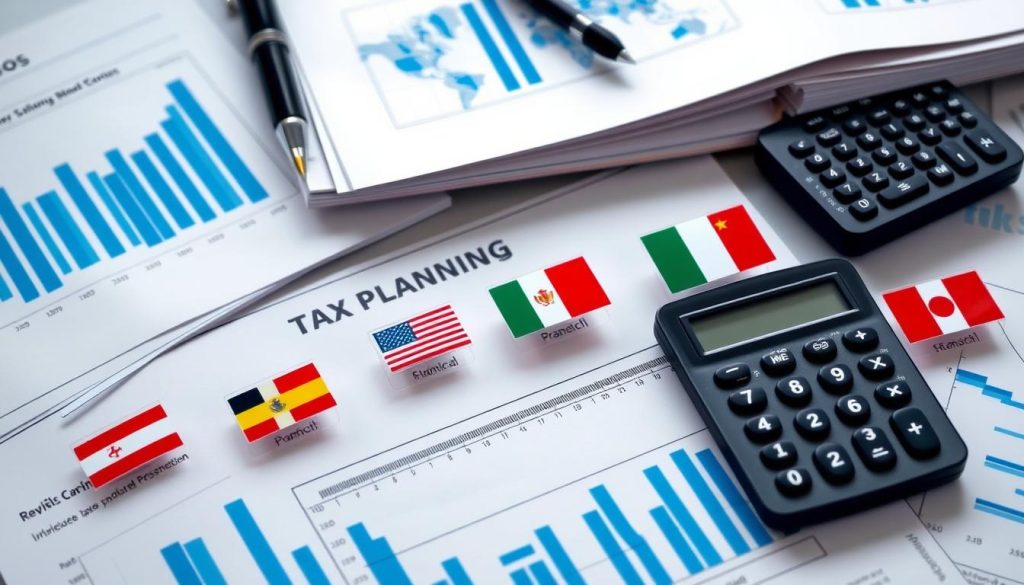Expanding your business globally requires careful consideration of various factors including tax regulations, market access, infrastructure quality, and workforce availability. Choosing the right country for your multinational business can significantly impact your success and growth potential. This comprehensive guide explores the best countries to start a multinational business in 2026, analyzing their unique advantages, business environments, and strategic benefits for international entrepreneurs.
Top Countries for Multinational Business Expansion
When establishing a multinational presence, certain countries consistently rank as top choices due to their favorable business conditions, strategic locations, and supportive regulatory frameworks. Our analysis reveals that Italy, Germany, France, Spain, Belgium, and several developing nations offer compelling advantages for different types of multinational operations.
Top countries for multinational business expansion with their key advantages
According to Statista’s Global FDI Report, foreign direct investment flows have shown significant recovery post-pandemic, with strategic investments increasingly targeting countries with strong digital infrastructure and innovation ecosystems.
Each country offers distinct advantages for multinational businesses, from Italy’s creative industries to Germany’s manufacturing prowess. Understanding these unique benefits is essential for making an informed decision about where to establish your global business presence.
Key Considerations for Multinational Expansion
Business Environment Factors
- Corporate tax rates and incentives
- Double taxation agreements
- Ease of company formation
- Political and economic stability
- Legal protections for foreign businesses
Operational Considerations
- Strategic location and market access
- Quality of infrastructure and logistics
- Availability of skilled workforce
- Banking and financial services
- Cultural compatibility and language barriers
Before diving into specific countries, it’s important to understand the different types of multinational enterprises and their unique requirements. Additionally, weighing the advantages and disadvantages of multinational corporations can help you determine if global expansion aligns with your business goals.
Italy: Creative Innovation and Manufacturing Excellence
Italy offers a unique blend of creative industries, manufacturing expertise, and strategic location in the heart of the Mediterranean. As the third-largest economy in the Eurozone, Italy provides access to over 500 million EU consumers while serving as a gateway to North Africa and the Middle East.
Key Advantages for Multinationals
- Strategic Location: Central position in the Mediterranean with excellent connectivity to Europe, North Africa, and the Middle East
- Tax Incentives: Special tax regimes for innovative startups and R&D activities with rates as low as 5% for qualifying intellectual property
- Skilled Workforce: Access to highly skilled workers in design, engineering, and manufacturing sectors
- Strong Industries: World-renowned excellence in fashion, food, luxury goods, machinery, and automotive sectors
“Italy’s combination of manufacturing expertise, design excellence, and strategic location makes it an ideal hub for companies looking to blend innovation with production capabilities.”
Best Cities for Business in Italy
Italy offers several strategic locations for establishing your multinational business, each with unique advantages. Milan, Rome, Turin, and Florence stand out as prime locations, with Milan serving as the country’s financial and fashion capital.
Explore Italian Business Opportunities
Discover Italy’s rich business landscape from traditional crafts to innovative startups.
For official information on starting a business in Italy, visit the Italian Ministry of Economic Development (MISE) website, which provides comprehensive guidance on regulations, incentives, and support programs for foreign investors.
Germany: Engineering Excellence and Economic Stability

Germany stands as Europe’s largest economy and a global leader in manufacturing, engineering, and innovation. With its central location in Europe, excellent infrastructure, and highly skilled workforce, Germany offers multinational businesses a stable and prosperous environment for growth.
Key Advantages for Multinationals
- Economic Stability: Strong, resilient economy with excellent credit rating and low inflation
- Infrastructure Excellence: World-class transportation, logistics, and digital infrastructure
- Innovation Ecosystem: Strong R&D landscape with close collaboration between industry and research institutions
- Strategic Location: Central position in Europe with access to 500+ million EU consumers
- Corporate Tax Benefits: Competitive corporate tax rate of approximately 30% (including solidarity surcharge and trade tax)
Germany offers specialized incentives for R&D activities, with tax credits of up to 25% for qualifying research expenses. Additionally, various federal and state-level grants are available for innovative projects and business expansion.
Thriving German Industries
Germany excels in several key sectors that offer significant opportunities for multinational businesses:
Manufacturing & Automotive
Home to global leaders like BMW, Mercedes-Benz, and Siemens, with world-class supply chains and engineering expertise.
Technology & Innovation
Thriving tech scene with strengths in Industry 4.0, IoT, artificial intelligence, and sustainable technologies.
Financial Services
Frankfurt serves as a major European financial hub, especially following Brexit, with excellent fintech opportunities.
Understanding Germany’s distinct business culture is essential for success. German business relationships are built on precision, reliability, and long-term thinking, with a strong emphasis on quality and engineering excellence.
Discover German Business Opportunities
Explore Germany’s diverse business landscape from manufacturing to innovative startups.
France: Innovation Hub with Global Reach

France combines a strategic location, excellent infrastructure, and a highly educated workforce with strong government support for innovation and entrepreneurship. As the world’s seventh-largest economy, France offers multinational businesses access to the EU market along with connections to French-speaking countries worldwide.
Key Advantages for Multinationals
- Innovation Support: Generous R&D tax credits covering up to 30% of qualifying expenses
- Strategic Location: Central position in Western Europe with excellent global connectivity
- Talent Pool: World-class education system producing highly skilled workers in engineering, technology, and business
- Infrastructure: Advanced transportation networks including high-speed rail, ports, and international airports
- Quality of Life: Exceptional healthcare, education, and cultural amenities attractive to international executives
| Business Indicator | France’s Position | Key Benefit |
| Corporate Tax Rate | 25% | Competitive within EU |
| R&D Tax Credit | 30% of expenses | Among the most generous globally |
| Startup Ecosystem | Top 3 in Europe | Strong innovation support |
| Infrastructure Quality | 8th globally | Excellent connectivity |
Innovative French Industries
France is at the forefront of several innovative sectors that offer significant opportunities for multinational businesses:
Technology & Digital Innovation
France has a thriving tech ecosystem, particularly in Paris’s “Silicon Sentier” district. The country is leading in IoT innovations and has a rapidly growing startup scene.
Transportation & Logistics
France is modernizing its transportation systems with sustainable solutions and smart infrastructure, creating opportunities for logistics and mobility companies.
Explore French Business Opportunities
Discover France’s innovative business landscape and expansion opportunities.
Spain: Gateway to Latin America and Tourism Excellence

Spain offers multinational businesses a strategic location bridging Europe, North Africa, and Latin America. With a competitive cost structure, improving business environment, and strong cultural ties to Latin America, Spain serves as an excellent gateway for companies looking to expand across Spanish-speaking markets worldwide.
Key Advantages for Multinationals
- Strategic Gateway: Natural bridge to Latin American markets with shared language and cultural ties
- Competitive Costs: Lower operating costs compared to other Western European countries
- Tax Incentives: Special tax regimes including the Spanish holding company (ETVE) with tax exemptions on foreign dividends
- Quality Infrastructure: Excellent transportation networks including high-speed rail and major ports
- Tourism Expertise: World-leading tourism sector with opportunities in hospitality, services, and technology
“Spain’s unique position as a gateway to both European and Latin American markets makes it an ideal location for multinational businesses seeking to leverage cultural and linguistic advantages across multiple regions.”
Thriving Spanish Industries
Spain excels in several key sectors that offer significant opportunities for multinational businesses:
Tourism & Hospitality
One of the world’s top tourism destinations with advanced infrastructure and digital innovation in the sector.
Renewable Energy
Leader in renewable energy with significant investments in solar, wind, and sustainable technologies.
Fashion & Retail
Home to global retail giants like Inditex (Zara), with a thriving fashion industry and innovative retail concepts.
Spain also offers excellent opportunities in the food and beverage sector, with its renowned culinary traditions and growing food tech industry. The country’s strategic location makes it an ideal base for companies looking to expand across Europe, North Africa, and Latin America.
Discover Spanish Business Opportunities
Explore Spain’s diverse business landscape and expansion opportunities.
Belgium: Heart of European Administration

Belgium offers multinational businesses a strategic location at the heart of Europe, hosting the headquarters of the European Union and NATO. With excellent connectivity, a multilingual workforce, and favorable tax structures for holding companies, Belgium serves as an ideal European headquarters location.
Key Advantages for Multinationals
- Central Location: Located at the crossroads of Western Europe with easy access to major European markets
- EU Administrative Center: Home to EU institutions providing direct access to European policymakers
- Multilingual Workforce: Skilled professionals fluent in Dutch, French, German, and English
- Tax Advantages: Notional interest deduction system and extensive network of tax treaties
- Logistics Excellence: World-class ports, airports, and transportation networks
Belgium offers the “innovation income deduction” allowing companies to deduct up to 85% of qualifying intellectual property income from their tax base, making it highly attractive for R&D-focused multinationals.
Belgium’s strategic position and business-friendly environment have attracted numerous multinational headquarters. The country offers excellent opportunities for companies looking to establish a European base with access to EU institutions and major markets.
Explore Belgian Business Opportunities
Discover Belgium’s diverse business landscape and multinational potential.
Emerging Markets: High Growth Potential

Developing nations offer multinational businesses significant growth opportunities with expanding consumer markets, competitive labor costs, and improving business environments. Countries across Southeast Asia, Latin America, and Africa present strategic advantages for companies looking to establish early market positions in high-growth regions.
Key Advantages in Emerging Markets
- High Growth Rates: Many developing economies growing at 5-7% annually, far outpacing developed markets
- Demographic Dividend: Young, growing populations creating expanding consumer markets
- Cost Advantages: Competitive labor and operational costs
- First-Mover Benefits: Opportunities to establish market leadership in developing sectors
- Investment Incentives: Many countries offering tax holidays and special economic zones
While emerging markets offer significant opportunities, they also present unique challenges including regulatory complexity, infrastructure limitations, and political risks. Thorough market research and local partnerships are essential for success.
For detailed guidance on identifying the right opportunities in developing nations, explore our guide on the best businesses to start in developing countries. The World Bank data portal also provides valuable economic indicators to help evaluate potential markets.
Explore Emerging Market Opportunities
Discover high-growth potential in developing nations worldwide.
Tax Considerations for Multinational Businesses

Tax optimization is a critical consideration when selecting countries for multinational operations. Understanding corporate tax rates, double taxation agreements, and special tax regimes can significantly impact your global tax position and overall profitability.
Key Tax Factors to Consider
Corporate Tax Rates
Corporate tax rates vary significantly across countries, from 0% in some tax havens to over 30% in others. However, the headline rate doesn’t tell the full story—effective tax rates after deductions and credits are often lower.
According to Statista’s corporate tax comparison, the global average corporate tax rate has been declining, creating more competitive tax environments worldwide.
Double Taxation Agreements
Double taxation agreements (DTAs) prevent the same income from being taxed twice in different countries. Countries with extensive DTA networks offer significant advantages for multinational operations.
Most developed nations have established comprehensive DTA networks, with countries like the Netherlands, UK, and Singapore having agreements with 90+ countries worldwide.
Special Tax Regimes
Many countries offer special tax regimes designed to attract specific types of multinational activities:
IP Box Regimes
Countries like Ireland, Netherlands, and Luxembourg offer reduced tax rates (often 5-10%) on income derived from intellectual property.
Holding Company Regimes
Luxembourg, Netherlands, and Singapore provide tax exemptions on dividends and capital gains for qualifying holding companies.
R&D Incentives
France, UK, and Canada offer generous tax credits and super-deductions for research and development activities.
“Effective multinational tax planning isn’t about finding the lowest tax rate, but rather creating a sustainable structure that aligns with your business operations while optimizing your global tax position.”
For a deeper understanding of how multinational corporations structure their operations for tax efficiency, explore our guide on how multinational corporations work.
Legal Structures for Multinational Operations
Choosing the right legal structure for your multinational operations is crucial for managing liability, optimizing taxes, and ensuring operational efficiency. Different structures offer varying advantages depending on your business goals and the countries involved.
Common Multinational Legal Structures
| Structure | Key Characteristics | Best For | Tax Implications |
| Foreign Subsidiary | Separate legal entity incorporated in host country | Long-term operations with significant local presence | Subject to local corporate tax; potential for dividend withholding tax |
| Branch Office | Extension of parent company, not a separate legal entity | Initial market entry or project-based operations | Taxed on local source income; profits attributable to branch |
| Holding Company | Parent entity that owns subsidiaries across multiple countries | Managing investments and intellectual property | Potential for participation exemption on dividends and capital gains |
| Joint Venture | Partnership with local entity or another multinational | Markets with foreign ownership restrictions or need for local expertise | Varies based on JV structure (corporate or partnership) |
Understanding the four types of multinational enterprises can help you determine which legal structure best aligns with your global strategy and operational model.
Many multinational companies use a combination of structures across different markets, tailoring their approach to local regulations, tax considerations, and business objectives in each country.
Success Factors for Multinational Expansion

Beyond selecting the right countries and legal structures, several critical factors contribute to successful multinational expansion. Companies that excel globally typically demonstrate strengths in cultural adaptation, talent management, and operational flexibility.
Keys to Multinational Success
- Strong local partnerships and networks
- Cultural intelligence and adaptability
- Robust compliance frameworks
- Balanced global-local decision making
- Digital infrastructure for remote collaboration
- Diverse leadership with international experience
Common Pitfalls to Avoid
- Insufficient market research
- Underestimating cultural differences
- Inadequate compliance resources
- Rigid global policies without local flexibility
- Poor communication across time zones
- Failure to adapt products/services to local markets
Building Global Capabilities
Successful multinational businesses invest in developing specific capabilities that enable effective global operations:
Cross-Cultural Leadership
Leaders with experience across multiple markets who can navigate cultural differences and build diverse teams.
Global-Local Balance
Organizational structures that balance global standards with local market responsiveness.
Digital Integration
Technology platforms that enable seamless collaboration, data sharing, and operational visibility across borders.
For a deeper understanding of how multinational corporations operate across borders, explore our guide on what multinational corporations do and the advantages and disadvantages of multinational business.
Comparing the Best Countries for Multinational Business
To help you make an informed decision about the best country for your multinational business, we’ve compiled a comparative analysis of key factors across our top recommended countries.
| Country | Corporate Tax Rate | Business Setup Time | Infrastructure Quality | Workforce Skills | Market Access |
| Italy | 24% | 5-7 days | Good | High (Design, Engineering) | EU + Mediterranean |
| Germany | ~30% | 7-10 days | Excellent | Very High (Engineering, Technical) | EU + Central Europe |
| France | 25% | 4-5 days | Very Good | High (Technical, Creative) | EU + Francophone |
| Spain | 25% | 10-15 days | Good | Good (Tourism, Services) | EU + Latin America |
| Belgium | 25% | 3-5 days | Excellent | High (Multilingual, Administrative) | EU + Administrative Hub |
“The ideal country for multinational expansion isn’t necessarily the one with the lowest taxes or fastest setup time, but rather the one that offers the best overall alignment with your specific business model, industry requirements, and growth objectives.”
For industry-specific opportunities across these countries, explore our guides on business ideas from France, business ideas from Italy, and business ideas from Germany.
Conclusion: Selecting Your Ideal Multinational Base
Choosing the best country to start a multinational business requires careful consideration of multiple factors including tax environment, market access, infrastructure quality, workforce availability, and alignment with your specific industry and business model.
Italy, Germany, France, Spain, Belgium, and various developing nations each offer unique advantages for different types of multinational operations. The ideal choice depends on your specific business objectives, industry focus, and long-term global strategy.
As you evaluate potential countries for your multinational business, consider working with local experts, conducting thorough market research, and potentially starting with a smaller-scale presence before committing to major investments. Understanding how multinational corporations work can provide valuable insights for your expansion strategy.
Explore More Multinational Business Resources
Discover comprehensive guides and insights for global business expansion.
Explore Multinational Business Guides
Discover Most Profitable Countries
















